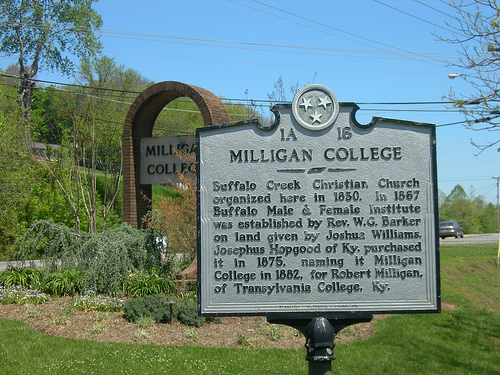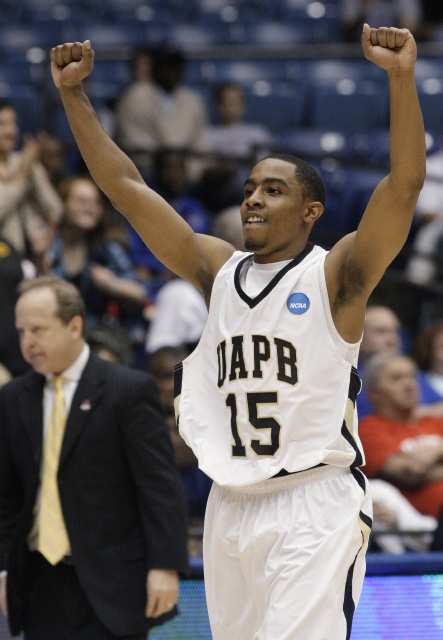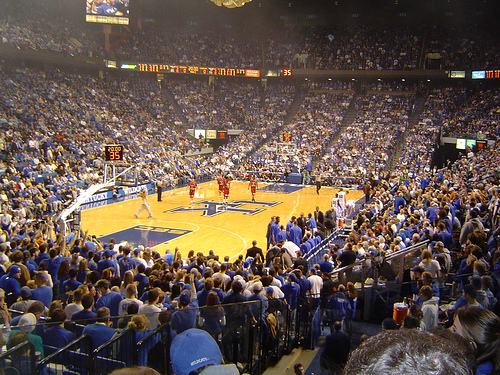In Their Words: Life at the Mid-Major Level (part four)
Posted by rtmsf on October 12th, 2010Andrew Murawa is the RTC correspondent for the Pac-10 and Mountain West Conferences and an occasional contributor.
To read the entire In Their Words series, click here.
Part Four: SCHEDULING
Over the summer, we’ve spent time hearing about some of the next big-name recruits on their way to college basketball: Jared Sullinger and Harrison Barnes, Anthony Davis and Michael Gilchrist. We’ve heard the big-time schools announce their high profile games on their upcoming schedules: Kentucky going to the Maui Invitational and visiting North Carolina, Michigan State hosting Texas and going to Duke. But for the vast majority of Division I programs, they’ve been flying under the radar. There are at present 73 teams that participate in basketball in the six BCS conferences, but there are 347 total programs in Division I. Of those other 274 programs, there are certainly quite a few big-name programs: last year’s national runner-up Butler comes to mind immediately, as does Gonzaga, Memphis and a handful of other schools in conferences like the Atlantic 10 and the Mountain West. But, we were also interested in how the other half (or really, how the other three-quarters) lives, so we spent some time talking to coaches, athletic directors and other people around the country affiliated with some of those other schools — those non-BCS schools, those “mid-majors” — and we asked them about how they recruit, how they create a schedule, how they market their programs, and quite a few other things. Over the next eight weeks, we’ll let them tell you their story, in their own words.
To begin, let me introduce and thank this week’s cast of characters:
- Murry Bartow, Head Coach, East Tennessee State – Bartow is entering his eighth season as the Buccaneers head coach, after having previously succeeded his father Gene Bartow as the head coach at UAB. Bartow has posted a 118-72 record in his years at ETSU and has racked up 241 total wins and four NCAA appearances in his 13 seasons as a head coach.
- Chris Lang, Writer, Lynchburg News & Advance: Lang has been the beat writer for Liberty University since 2005 after having spent eight years as the Sports Editor at the Arizona Daily Sun in Flagstaff, Arizona.
- Tommy Dempsey, Head Coach, Rider – Dempsey enters his fifth season as the head man at Rider, following two seasons as an assistant. He has compiled an 83-75 record over that time and coached NBA lottery pick Jason Thompson during his time there.
- George Ivory, Head Coach, Arkansas-Pine Bluff – Ivory enters his third season in Pine Bluff, where he has turned the Golden Lions into winners. UAPB turned around an 0-11 start last season by finishing 18-5 over their last 23 games, winning UAPB’s first SWAC tournament title in 43 years and advancing to the NCAA tournament before losing to eventual national-champion Duke.
- Jason James, Head Coach, Tennessee-Martin – James enters his second season as the head coach at UT-Martin following eight seasons as an assistant coach there. His first season was rough, to the tune of 4-25, after he was appointed head coach in the wake of scandal with the previous head coach. But James, the recruiter who brought Lester Hudson to UT-Martin, has plans to begin to turn things around this season.
- Dale Layer, Head Coach, Liberty – Layer enters his second season at Liberty after having spent a season as an assistant at the university in 2007-08. In between, he spent a year at Marquette and previously he spent seven seasons as the head coach at Colorado State. He has compiled a 118-122 record in his eight seasons as a Division I head coach.
- Eric Brown, Assistant Coach, Long Beach State – Brown enters his fifth year as an assistant on head coach Dan Monson’s staff, after previously having spent time on coaching staffs at Cal-State Northridge, USC and Iowa State.
Last time we talked about the difficult process that mid-major basketball programs go through when putting together their non-conference schedules, and we’ll get more of that here. When teams have a hard time finding quality opponents who are willing to come to their place, their choices get relegated to playing insanely tough opponents (like with Long Beach State who we discussed last time), playing a ton of road games as is normal for many mid-majors, or watering down the schedule with teams in the bottom reaches of Division I and even lower divisions of basketball. At East Tennessee State, for example, they had trouble finding anybody to come to Johnson City to play them, with Tennessee Tech and NAIA-school Milligan College the only non-conference home games on their schedule.
Murry Bartow, Head Coach, East Tennessee State: Yup. That’s all we’ve got is two non-conference home games, and one of those in a non-DI school. But we just really struggled, more this year than I ever have as a head coach, to get home-and-homes started. And again, to get games is easy. To go on the road is easy. To get people to be willing to play you at home is not an easy thing.
Chris Lang, Beat Writer for Liberty, Lynchburg News & Advance: Between Liberty and Virginia or Virginia Tech, the biggest difference is scheduling. They can’t get anyone to come here to play men’s basketball games. There’s a reason they play three or four NAIA or non-DI’s a year, because you can’t get anyone. If you’re Coach Layer, you can take money game after money game, but do you want to put your team through that and never get a chance to play at home and get used to your home court? I know for this year’s schedule they have five non-conference home games and only two of them are against Division I teams. They got George Mason and William & Mary to come here, but it is very difficult.
The difficulties in scheduling, and specifically the difficulties in getting home games, lead to problems in terms of winning games. No matter the level of competition, it is hard to win on the road. So, the more road games a team has to play, the more likely losses can begin piling up.
Tommy Dempsey, Head Coach, Rider: The thing is, the leagues at mid-major level are just so balanced, and you can’t get non-conference home games, so in order to have a great year, you have to either dominate your league or win a lot of non-conference road games. And over time, those two things have been very difficult to do. It is hard to dominate a league that is so balanced where every night you can get beat. And non-conference road games are very difficult to win. So it makes having that 22- to 25-win year hard -– you had better be really, really good. And that’s why you see so many of the mid-majors at the end of non-conference play under .500 and so many of them hovering around .500.
And when mid-major programs lose games early, whether they be against big BCS teams on the road or in tournaments 0r even in their home games, it can hurt the confidence of the players, and it can diminish the support of the fans.
Bartow: The fans just have to be realistic. As a head coach, you don’t want to come out in the paper and be negative, you don’t want to come out and say, “hey fans, we’re going to lose a lot of these games,” but fans have to be realistic, fans have to understand the big picture. Again, when I go into these games, I hope we can win them all, I hope we can go undefeated, but I’m also old enough and experienced enough as a head coach to know when you go in and play Kentucky or Ole Miss on the road or Dayton on the road, chances are, you’re going to lose those games. So you just have to understand the big picture of what you’re trying to get done and fans have to be understanding as well.
At Arkansas-Pine Bluff, they worked their way through a rough 0-11 start to last season during a tough non-conference stretch featuring 11 straight road games with eight of them against BCS conference teams, before being able to turn it around and eventually earn their way into the NCAA tournament.
George Ivory, Head Coach, Arkansas-Pine Bluff: Our team was good about it. You come to school and you want to play against tough competition. We started 0-11, but our minds were always positive. One thing we did last year that was maybe a little different than the year before was to just focus on our academics and the guys understood that their number one goal when coming to college was to get a degree. So we focused on that and it kept a lot of tension off of the 0-11 stretch for our guys.
The Arkansas-Pine Bluff model, a model similar to Long Beach State’s plan, is to play tough teams to toughen your squad up for conference play and the postseason. And many coaches found at least some validity to such a plan.
Jason James, Head Coach, UT Martin: I think the more hostile the environment in non-conference, the more it prepares our guys for hostile environments in conference. It can only make us better.
Ivory: I think it helps us a lot because you’re going to different environments and playing against different caliber of talent. Some teams will have great big men and some teams have great guards and I think playing different styles prepares us for our conference play.
Dale Layer, Head Coach, Liberty: We’ll be tested early, we’ll be exposed early. The lessons that we will learn at Notre Dame, at South Florida, at Texas Tech will carry over for the rest of the year. We don’t want to be exposed in league play, so you hope that someone will do that to you early so you can work on those areas, address them and move forward and be prepared when conference starts in December.
Bartow: I do those games for a lot of reasons. First and foremost, I think it helps our team. Ultimately I’m playing for March, because it is very, very, highly unlikely that we’re going to get an at-large bid, so I’m really playing for March. I’m thinking about what we can do in November and December, what we can do in our non-conference that is going to make us a better team come February and March. So when we play good people, it is obviously going to toughen us up, it is going to make your weaknesses very glaring, it is going to help you as a coach know where you’ve got to improve. And hopefully you can win some of those games. You know, last year we were able to beat Arkansas on the road. It’s not easy to do, but hopefully you can slip up and win a couple of games here and there. But then from a recruiting standpoint, it’s critical when we show our nonconference schedule to prospective student-athletes, it’s just critical that they see those names, whether it be Kentucky or Mississippi State or Ole Miss or Dayton, or whoever it is.
Recruiting. There it is again. When all is said and done, the biggest part of a job of a college basketball coach is to get good players. And if, playing at places like Kentucky, North Carolina and Kansas is going to give you a bit of an edge over your competition for a student-athlete, you can bet coaches will give it some consideration.
Ivory: That’s the challenge we give here, we think playing a tough schedule does help us a lot. When you show a kid that kind of schedule and that you’re playing that kind of competition, some kids want that challenge and those are the kids we’re looking for, the kids that want that challenge to play those big universities.
Eric Brown, Assistant Coach, Long Beach State: You want to schedule teams that are challenging. Last year, we came out of our non-conference schedule 6-7, but our strength of schedule was number one in the country. And we can use this as a recruiting tool. We can sit down with a recruit and say, you know what, we’re going to these places, we’re going to North Carolina, we’re going to Kentucky.
Dempsey: It does help to play those big schools in recruiting. I’m pretty aggressive in that regard. We don’t run from games and we want to play good teams. Even if it is not necessarily a Kentucky, it is good to play good teams, to play good Atlantic 10 teams in our area. It is good to schedule good teams, it increases the visibility of your program, it helps to put an attractive schedule together for recruits. If you want people to respect your program as a mid-major, you have to play people, and to be honest, you may not have to beat them all, but you do have to win some of those marquee games. I can’t tell you what it does when you go to Mississippi State and beat a nationally ranked team like that. I can’t tell you what it does for the exposure of your program. You’re on every website in the country the next morning, the telephone rings off the hook, your fans get so excited about your team. Wins like that go so far, and you can’t get wins like that if you don’t go play those games.
Next time around we’ll take a look at another of the big benefits that are associated with playing tough non-conference road games, a factor that most mid-major programs have to be conscious of: money. We’ll also take a look at the early-season tournaments and events that can aid mid-majors in their scheduling. And we’ll look at some of the success stories, including one mid-major program that will be hosting Kentucky this season. Join us next Tuesday for Part Five of In Their Words: Life at the Mid-Major Level.














































